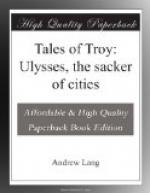Thus the battle rang, and shone, and shifted, till few of the Greeks kept steadfast, except those with Menelaus and Agamemnon, for Diomede and Ulysses were far away upon the sea, bringing from Scyros the son of Achilles. But Teucer slew Polydamas, who had warned Hector to come within the walls of Troy; and Menelaus wounded Deiphobus, the bravest of the sons of Priam who were still in arms, for many had fallen; and Agamemnon slew certain spearmen of the Trojans. Round Eurypylus fought Paris, and Aeneas, who wounded Teucer with a great stone, breaking in his helmet, but he drove back in his chariot to the ships. Menelaus and Agamemnon stood alone and fought in the crowd of Trojans, like two wild boars that a circle of hunters surrounds with spears, so fiercely they stood at bay. There they would both have fallen, but Idomeneus, and Meriones of Crete, and Thrasymedes, Nestor’s son, ran to their rescue, and fiercer grew the fighting. Eurypylus desired to slay Agamemnon and Menelaus, and end the war, but, as the spears of the Scots encompassed King James at Flodden Field till he ran forward, and fell within a lance’s length of the English general, so the men of Crete and Pylos guarded the two princes with their spears.
There Paris was wounded in the thigh with a spear, and he retreated a little way, and showered his arrows among the Greeks; and Idomeneus lifted and hurled a great stone at Eurypylus which struck his spear out of his hand, and he went back to find it, and Menelaus and Agamemnon had a breathing space in the battle. But soon Eurypylus returned, crying on his men, and they drove back foot by foot the ring of spears round Agamemnon, and Aeneas and Paris slew men of Crete and of Mycenae till the Greeks were pushed to the ditch round the camp; and then great stones and spears and arrows rained down on the Trojans and the people of Eurypylus from the battlements and towers of the Grecian wall. Now night fell, and Eurypylus knew that he could not win the wall in the dark, so he withdrew his men, and they built great fires, and camped upon the plain.
The case of the Greeks was now like that of the Trojans after the death of Hector. They buried Machaon and the other chiefs who had fallen, and they remained within their ditch and their wall, for they dared not come out into the open plain. They knew not whether Ulysses and Diomede had come safely to Scyros, or whether their ship had been wrecked or driven into unknown seas. So they sent a herald to Eurypylus, asking for a truce, that they might gather their dead and burn them, and the Trojans and Khita also buried their dead.
Meanwhile the swift ship of Ulysses had swept through the sea to Scyros, and to the palace of King Lycomedes. There they found Neoptolemus, the son of Achilles, in the court before the doors. He was as tall as his father, and very like him in face and shape, and he was practising the throwing of the spear at a mark. Right glad were Ulysses and Diomede to behold him, and Ulysses told Neoptolemus who they were, and why they came, and implored him to take pity on the Greeks and help them.




